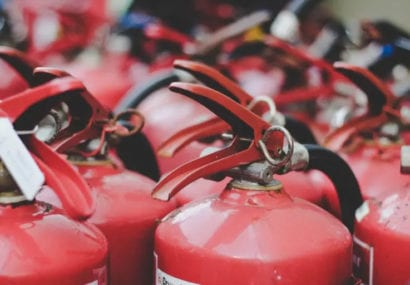Fire Regulations for Commercial Buildings
Posted: 16th October 2019
Why do we have them?
Within a commercial property, certain fire safety regulations must be adhered to. This is to ensure the property is safe for those working within it, as well as any customers or clients. There are currently nearly 20,000 commercial fires in the UK each year, so fire safety is of the utmost importance.
All commercial fire safety legislation in England and Wales falls under The Regulatory Reform (Fire Safety) Order 2005, which was designed specifically to simplify the existing legal requirements at that time.
With some minor exceptions, most commercial premises are bound by the following regulations.
Depending on the individual premises, commercial fire regulations may be the responsibility of:
- The owner
- The landlord
- The employer
- The occupier
Or anyone else who may have control of the building, such as a facilities manager, risk assessor or commercial property management company.
Who is defined in commercial fire regulations as a ‘Responsible Person’?
The individual who is responsible for these fire regulations being carried out is known as a ‘Responsible Person’. Every business must have at least one designated ‘Responsible Person’ and it is their responsibility to ensure that certain duties are carried out, action is taken to prevent fires and prevent injury or death if a fire does occur.
A ‘Responsible Person’ is accountable for:
- Carrying out a regular fire risk assessment
- Informing staff or their representatives of any safety risks you have identified
- Ensuring appropriate fire safety measures are in place
- Maintaining these safety measures
- Providing fire safety information, instructions and training to staff
- Creating adequate safety plans to be carried out in the event of an emergency
Commercial fire regulations
The fire safety regulations for commercial buildings differ to residential properties in several ways and there are a number of procedures and regulations that must be adhered to in order to ensure the building is as safe as possible:
What do commercial fire regulations say about Fire Risk Assessments?
All businesses and commercial properties must have a regular fire risk assessment, which is the responsibility of the Responsible Person. This is one of the first things an inspecting officer from the fire authority would request to see if they inspected a commercial premises, alongside the fire safety log book.
Your fire risk assessment must:
- Be reviewed regularly
- Be recorded by law if you have more than four employees
- Be documented if the property requires a licence
- Be documented if the fire brigade has issued an alterations notice
- Record any findings and actions which need to be taken
Many commercial businesses choose to use a specialist fire risk assessor to carry out their risk assessment, but this is not obligatory.
Anyone in the company who carries out a fire assessment must be able to:
- Identify and potential fire risks
- Identify any individuals at risk
- Assess the suitability of fire safety prevention measures such as fire alarms and sprinkler systems
- Assess the existing safety measures such as escape routes and fire drills
- Create and implement a fire safety action plan
- Keep the fire risk assessment updated
If a commercial business does not adhere to the required fire safety regulations, they face a fine, prosecution or in cases of extreme negligence, a prison term.
What do commercial fire regulations say about fire extinguishers?
Fire safety regulations specify that commercial premises must be equipped with appropriate fire fighting equipment. This includes fire extinguishers as standard and, depending on the nature of the business, may also include sprinklers and hose reels.
Fire extinguishers in a commercial building must:
- Undergo an annual maintenance test to ensure they are in good working order
- Be appropriate for the type of business and the location they are situated
- Be maintained by a competent person
What do commercial fire regulations say about fire safety signs?
All businesses and commercial premises must, by law, have at least two fire safety signs visible:
Fire Action Notice – explains what to do in the event of a fire
Fire extinguisher ID sign – explains the type of fire extinguisher and its location
What do commercial fire regulations say about fire alarms?
By law, all commercial premises must have an appropriate fire detection system in place. The system must be tested weekly and should be serviced at least every six months.
If your business is more at risk of a fire, such as a restaurant, an automatic system is recommended. Manual systems should suffice for lower risk business premises.
For all businesses, everyone in the building must be able to hear the alarm clearly and there must be a call point on every floor.
What do commercial fire regulations say about emergency lighting?
Emergency lighting is designed to provide light if the normal lighting in a building fails in a fire.
 This type of lighting has three primary purposes:
This type of lighting has three primary purposes:
- Escape route lighting – illuminates safe exit routes from a building
- Open area lighting – also known as panic lighting, these lights keep communal areas illuminated
- High risk task area lighting – provides sufficient light to provide visibility to shut down processes or equipment which may be dangerous
Your emergency lights should be ‘flick-tested’ – turned on and off – monthly and serviced fully annually.
For any advice and assistance in fire safety, please contact the team and we will be more than happy to help.
Find an Electrician Near Me
If you find that you home or business is not within the operating area of Care Projects, then a good place to look is on the NICEIC website. Here is an up to date list of all NICEIC registered electricians such as Care Projects who will be able to assist you with your electrical needs.
Back to blog





